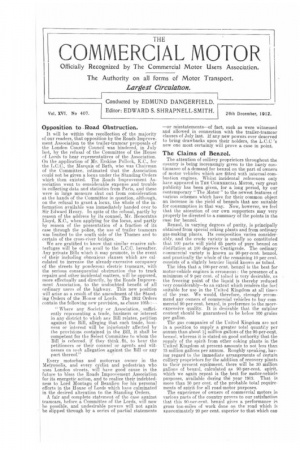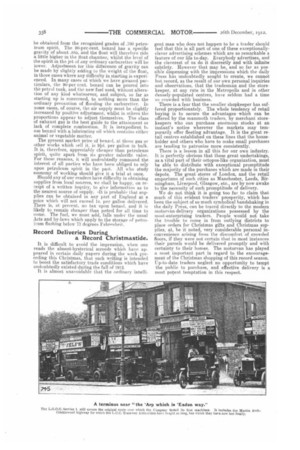Opposition to .Road Obstruction.
Page 1

Page 2

If you've noticed an error in this article please click here to report it so we can fix it.
It will be within the recollection of the majority of our readers, that opposition by the Roads Improvement Association to the trailer-tramcar proposals of the London County Council was hindered, in July last, by the refusal of the Committee of the House of Lords to hear representatives of the Association, On the application of Mr. Erskine PciHock, K.C., for the L.C.C., the Marquis of Bath, who was Chairman of the Committee, intimated that the Association could not be given a locus under the Standing Orders which then existed. The Roads Improvement Association went to considerable expense and trouble in collecting data and statistics from Paris, and these were in large measure shut out from consideration at the hands of the Committee in question, although, on the refusal to grant a locus, the whole of the information available was immediately handed over to Sir Edward Henry. In spite of the refusal, partly by reason of the address by its counsel, Mr. Honoratus LloycT K.C., when applying for the locus, and partly by reason of the presentation of a fraction of its ease through the police, the use of trailer tramcars was limited to the south side of the Thames and to certain of the cross-river bridges.
We are gratified to know that similar evasive subterfuges will be of no avail to the L.C.C. here.after. Any private Bills which it may promote, in the event of their including obnoxious clauses which are calculated to increase the already-excessive occupancy of the streets by ponderous electric tramcars, with the serious consequential obstruction due to track repairs and other incidental matters, will be opposed, more effectually and directly, by the Roads Improvement Association, to the undoubted benefit of all ordinary users of the highway. This new position will arise as a result of the amendment of the Standing Orders of the House of Lords. The 1912 Orders contain the following new provision, as clause 105b
Where any Society or Association, sufficiently representing a trade, business or interest in any district to which any Bill relates, petition against the Rill, alleging that such trade, business or interest will be, injuriously affected by the provisions contained in the Bill, it shall be competent. for the Select Committee to whom the Bill is referred, if they think .-fit, to hear the petitioners or their counsel-, or agents and witnesses on such allegation against the Bill or any part thereof."
Every motorbus and motorvan owner in the Metronolis, and every cyclist, and pedestrian who use London streets, will have good cause in the future to bless the Roads Improvement Association for its energetic action, and to realize their indebtedness to Lord Montagu of Beaulieu for his personal efforts in the House of Lords which have culminated in the desired alteration to the Standing Orders, A fair and complete statement of the case against tramcans, before a Committee of the Lords, will now he possible, and undesirable powers will not again be slipped through by a series of partial statements —or misstatements—of fact, such as were witnessed and allowed in connection with the trailer-tramear clauses of July last. If any new powers ever deserved to bring drawbacks upon their holders, the L.C.0 's new one most certainly will prove a case in point.
The Claims of fienzol.
The attention of colliery proprietors throughout. the country is being increasingly given to the luiely continuance of a demand for benzol on the part of owners of motor vehicles which are fitted with internal-combustion engines. Whilst incidental references only have appeared in THE COMMERCIAL MOTOR, very great publicity has been given, for a long period, by our contemporary "The Motor" to the newest features of various schemes which have for their common object an increase in the yield of benzols that are suitable for consumption in that way. Now, however, we feel that the attention of our own supporters may very properly be directed to a summary of the points in the ease for benzol.
Benzol, in varying degrees of purity, is principally obtained from special coking plants and from ordinary gas-making plants. Its composition varies considerably, and the crude variety is usually so constituted that 100 parts will yield 65 parts of pure benzol on distillation at 100 degrees Centigrade. The ordinary uornmercial variety is known as 90-per-cent. henzol, and practically the whole of the remaining 10 per cent. consists of a slightly heavier liquid known as toluol.
The idea that a 100-per-cent. benzol is the best for motor-vehicle engines is erroneous : the presence of a minimum of 9 per cent. of Lohiol is very desirable, as the freezing point of the liquid is thereby reduced very considerably—to an extent which renders the fuel suitable for use in the United Kingdom at all times of the year. We would, therefore, strongly recommend any owners of commercial vehicles to buy commercial 90-per-cent. benzol, in preference to the moreexpensive quality. It is desirable that the sulphur content should be guaranteed to be below 100 grains per gallon.
The gas companies of the United Kingdom are net in a position to supply a greater total quantity per annum than about VI million gallons of the 90-per-cent. benzol, whereas it is stated on good authority that the supply of the spirit from other coking plants in the United Kingdom at present amounts to not less than 15 million gallons per annum. Roughly speaking, having regard to the immediate arra-ngements of certain colliery proprietors for the addition of recovery plants to their present equipment, there will be 30 million gallons o-f benzol. calculated as 90-per-cent. spirit, which we again repeat is thebest for motor-vehicle purposes, available during the' year 1913. That is more than 30 per cent. of the probable total requirements of spirit for all road-motor purposes.
The experience of owners of commercial motors in various parts of the country proves to our satisfaction that this 90-ner-cent. benzol gives a performance in gross ton-miles of work done on the road which is eneroximately 20 per cent.. superior to that which can be obtained from the recognized grades of .760 petroleum spirit. The 90-per-cent. benzol has a specific gravity of about .885, and the float will therefore ride a little higher in the float chamber, whilst the level of the spirit in the jet of any ordinary carburetter will be lower. Adjustment for this difference of gravity can be made by slightly adding to the weight of the float, in those cases where any difficulty in starting is experienced. In many cases of which we have gleaned particulars, the 90-per cent. benzol can be poured into the petrol tank, and the new fuel used, without alteration of any kind whatsoever, and subject, so far as starting up is concerned, to nothing more than the ordinary precaution of flooding the carburetter. lii some cases, of course, the air supply must be slightly increased by positive adjustment, whilst in others the proportions appear to adjust themselves. The class of exhaust gas is the best guide to the attainment or lack of complete combustion. It is inexpedient tu use benzol with a lubricating oil which contains either animal or vegetable matter.
The present market price of benzol, at those. gas or other works which sell it, is 90. per gallon in bulk. It is, therefore, appreciahly cheaper than petroleum spirit, quite apart from its greater calorific value. For these reasons, it will undoubtedly command the interest of all parties who have been obliged to rely upon petroleum spirit in the past. All who study economy of working should give it a trial at once.
Should any of our readers have difficulty in obtaining supplies from local sources, we shall be happy, on reeeipt of a written inquiry, to give information as to the nearest source of supply, -It is probable that supplies can be obtained in any part of England at a price which will not exceed Is. per gallon delivered. There is, at present, no tax upon benzol, and it is likely to remain cheaper than petrol for all time to come. The fuel, we must add, falls under the usual Acts and by-laws which apply to the storage of petroleum flashing below 73 degrees Fahrenheit.
Record Deliveries During a Record Christmastide.
It is difficult to avoid the impression, when one reads the almost-hysterical screeds which have, appeared in certain daily papers during the week preceding this Christmas, that such writing is intended to boost the satisfactory trade conditions which have undoubtedly existed during the fall of 1912.
It is almost unavoidable that the ordinary intelli
gent man who does not happen to be a trader should feel that this is all part of one of these exceptionallyclever advertising schemes which are so remarkable a feature of our life to-day. Everybody advertises, and the cleverest of us do it discreetly and with infinite subtlety. However that may be, and so far as possible dispensing with the impressions which the daily Press has undoubtedly sought to create, we cannot but record, as the result of our own personal inquiries and observations, that the tradesman and the storekeeper, at any rate in the Metropolis and in other densely-populated centres, have seldom had a time so crowded with business.
There is a fear that the smaller shopkeeper has suffered proportionately. The whole tendency of retail buying is to secure the advantages which can be offered by the mammoth traders, by merchant storekeepers who can purchase enormous stocks at an instant's notice wherever the markets may temporarily offer fleeting advantage. It is the great retail centres established on these lines that the householder and others who have to make small purchases are tending to patronize more consistently.
There is a lesson in all this for our own industry. It is perfectly obvious that these great undertakings, as a vital part of their octopus-like organization, must be able to distribute with exceptional promptitude the majority of the purchases which are made in their depots. The great stores of London, and the retail emporiums of such cities as Manchester, Leeds, Birmingham, Liverpool, Glasgow, etc., are by now awake to the necessity of such promptitude of delivery.
We do not think it is going too far to claim that much of this evident traders' prosperity, which has been the subject of so much symbolical handshaking in the daily Press, can be traced directly to the modern motorvan-delivery organizations possessed by the most-enterprising traders, People would not take the trouble to come in from outlying districts to place orders for Christmas gifts and Christmas supplies, at, be it noted, very considerable personal inconvenience arising from the discomfort of crowded floors, if they were not certain that in most instances their parcels would be delivered promptly and with certainty to their homes. The motorvan has played a roost important part in regard to the encouragement of the Christmas shopping of this record season. Up-to-date traders neglect no opportunity to tempt the public to purchase, and effective delivery is a most potent temptation in this respect.




















